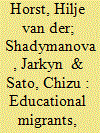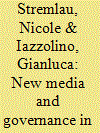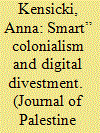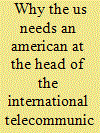|
|
|
Sort Order |
|
|
|
Items / Page
|
|
|
|
|
|
|
| Srl | Item |
| 1 |
ID:
167120


|
|
|
|
|
| Summary/Abstract |
Previous research on transnational migration and information and communication technologies (ICTs) demonstrated how ICTs shape transnational social relationships. What remains less explored is how ICTs shape spatial dimensions of such relationships. Also, international educational migrants constitute a substantial part of transnational migration flow, yet their everyday lives are not well studied. Building upon material semiotic scholarship, we examine how ICTs shape socio-spatial dimensions of transnational relationships in the lives of educational migrants, and the impacts that such relationships have on their everyday lives. This research is based on the empirical exploration of 21 in-depth interviews with educational migrants who came from Central Asian and African countries to the Netherlands. We show that spatial relationships, such as co-presence and distance, are not naturally ‘given’ but are instead enacted in heterogeneous communication practices of educational migrants, and these relationships produce both enabling and constraining effects on their everyday lives.
|
|
|
|
|
|
|
|
|
|
|
|
|
|
|
|
| 2 |
ID:
155829


|
|
|
|
|
| Summary/Abstract |
The advance of information and communication technologies (ICTs) has fundamentally changed the way people communicate and interact with each other, and the rise of the Internet profoundly affects political participation. In applying the latest Asian Barometer surveys, we discovered Internet-driven divergent effects on political participation, suggesting rising Internet usage is simultaneously associated with decreasing electoral and increasing activist participation. Further analysis revealed that the divergent effects can be explained by severe frustration with the political system and economic conditions. When considering state polity characteristics, we found that the Internet-driven divergent effects in a democratic context refer to a coincidence of two Internet-related effects that decrease electoral and increase activist participation; in an authoritarian context, they indicate a correlation between greater Internet usage and a preference for activist over electoral participation.
|
|
|
|
|
|
|
|
|
|
|
|
|
|
|
|
| 3 |
ID:
154789


|
|
|
|
|
| Summary/Abstract |
The role of new media in shaping the interactions of formal and informal leaders with their audiences is frequently misunderstood and often narrowly focussed on electoral processes and political competition. By weaving together strands of scholarship on political communication and political settlement while engaging with concepts of hybrid governance and leadership more prevalent in the African studies literature, this article takes a different, wider focus. We attempt to knit a framework that challenges normative assumptions on institutional communicative practices and considers the role of power, leadership and communications in both exacerbating and mitigating violent conflict in emerging and consolidating democracies. By bringing together disparate strands of scholarship that are rarely in dialogue, we question a characterisation that contrasts vertical mainstream media with more horizontal and inclusive social media, arguing that a more nuanced view of the political significance of these spaces is required, one that highlights their interplay and blurs the boundaries between online and offline. In doing so, the article places power at the centre of analysis to examine how entrenched relations of patronage can be left unscathed, transformed or even reinforced by networked forms of communication.
|
|
|
|
|
|
|
|
|
|
|
|
|
|
|
|
| 4 |
ID:
140967


|
|
|
|
|
| Summary/Abstract |
The role of media in promoting political accountability and citizen participation is a central issue in governance debates. Drawing on research into the interactions between radio station owners, journalists, audiences and public authorities during Somali radio call-in programmes we argue that these programmes do not simply offer a new platform for citizens to challenge those who are governing but that they are also spaces where existing power structures reproduce themselves in new forms. We identify the ways the programmes are structured and the different motivations the audience has for participation. Three types of programmes are identified and their relationships with patronage, politics, and performance are examined. Rather than focusing on normative assumptions about the media as a tool of accountability, the article emphasises the importance of understanding radio programmes in their social and political environment, including the overlapping relationships between on-air and off-air networks.
|
|
|
|
|
|
|
|
|
|
|
|
|
|
|
|
| 5 |
ID:
164815


|
|
|
|
|
| Summary/Abstract |
Much has been written about how information communication technologies (ICTs) detract from nations' planning and development norms, but there remains insufficient theoretical examination of the way ICTs may drive extranormative national aims. This paper examines such a case by disentangling the complicated relationships between telecommunications, city planning, and economic development in one modern settler-colonial context. The author explores how planning and development norms are adulterated in Palestine-Israel to further a select set of interests, in the service of an evolving national project. Palestinian and Israeli demographics and telecommunications infrastructure on both sides of the Green Line are examined, revealing the role of these technologies in facilitating population dispersal, economic exploitation, and political control at various stages of settler colonialism.
|
|
|
|
|
|
|
|
|
|
|
|
|
|
|
|
| 6 |
ID:
188491


|
|
|
|
|
| Summary/Abstract |
INFORMATION and communication technologies (ICTs) are becoming key tools of international influence for nations. Geopolitical rivalry has largely shifted to the ICT realm. A nation's level of digitalization now ranks alongside its economic, political, and military strength as a determinant of its international status.
|
|
|
|
|
|
|
|
|
|
|
|
|
|
|
|
|
|
|
|
|